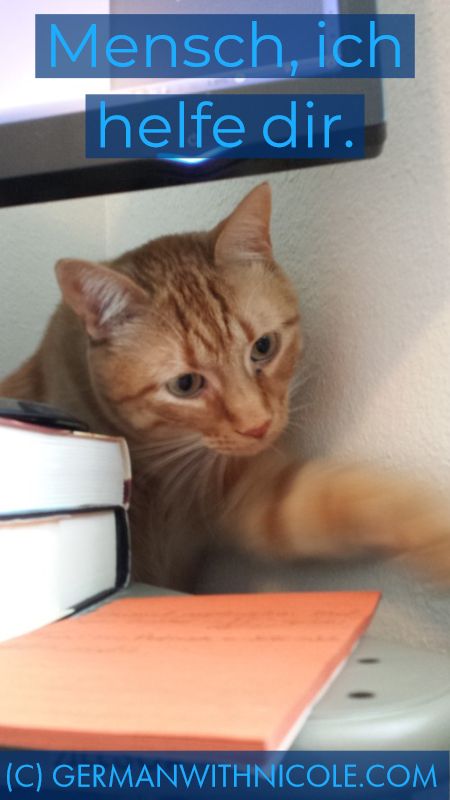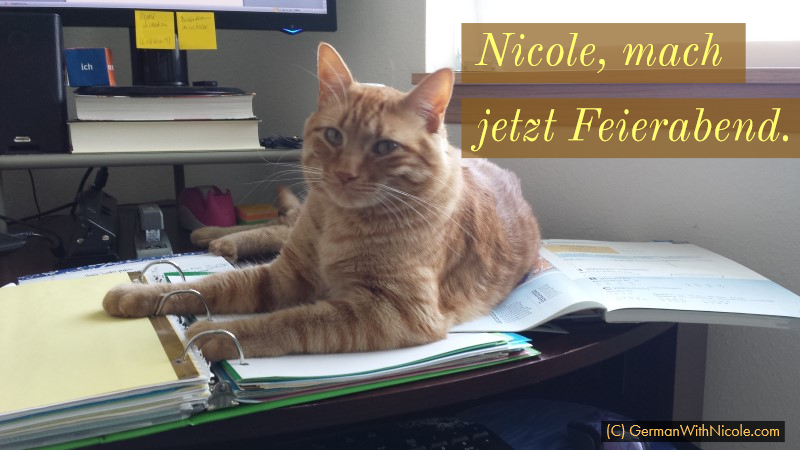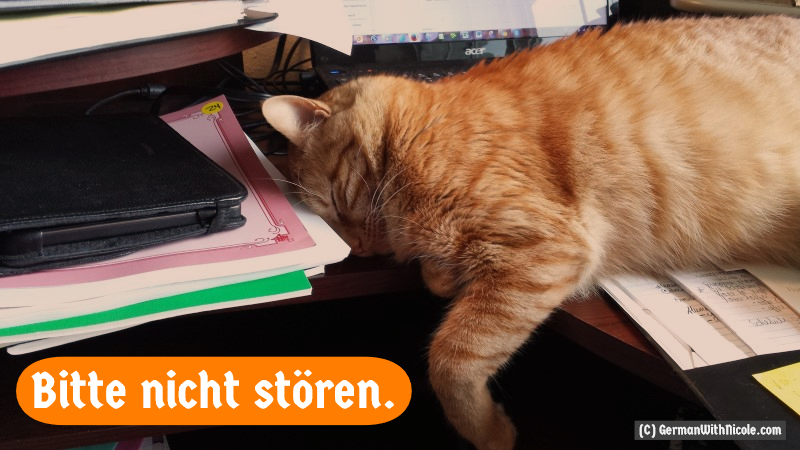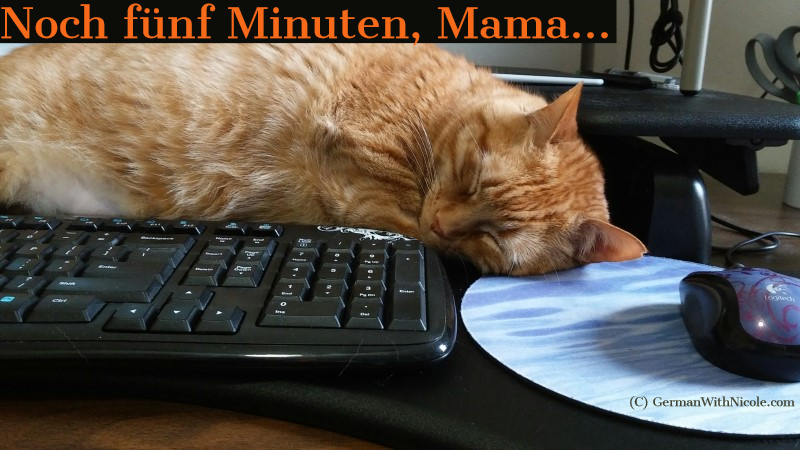Stichwörter (Keywords):
Would you like to learn more German?
- Details
- Category: German learning methods
I grew up in a family of entrepreneurs. My grandfather came back from WWII having learned to waterski in Switzerland while he was on leave. He and my grandmother first opened up a gas station, which quickly turned into a gas station which sold boats, which then turned into a boat and snowmobile dealer, and for decades has been exclusively a full-fledged marine dealer in western Wisconsin. My grandparents worked really hard and were able to create a lifestyle that worked for them, because their business was a part of it.
Five and a half years ago I quit my temp job, tried to open one business (which went nowhere, fast), and then six months later tried teaching German online. It started to take off quickly and I knew I was onto something good. In 2015 I knew I had a solid basis for a business and took a business plan class and a business personality test. Turns out I have the archetypal personality of an entrepreneur. So bin ich eben!
Being an entrepreneur means you have a different view of how things should work, that things should develop quickly because things needn't stand in your way, and also that you can create what I call the culture of your business. The culture of my business is very different than other German classes and lessons and that starts with making this a professional venture. Das hier ist kein Hobby von mir, sondern mein Geschäft! When I approach lessons as an official relationship between the client and myself, the dynamic changes. It becomes a consultation as well as a time and space for learning, trying new things, experimenting, and discovery.
Here I want people to learn to speak German, not just talk about it. Week after week, month after month I hear story after story of people who learned to read German literature in college but they can't hold a conversation in German. Folks show up for tutoring who are in the second class of a hobby-type German class and they're being asked to learn something that's actually at an intermediate level. Das macht mich wahnsinnig! If you are paying your good, hard-earned money (or your valuable student loan money!) to take a German class, you better darn well be acquiring skills for communicating in German. I don't even care if you learn the names of the cases correctly, but that you can get your point across!
I learned German with books, methods, and teachers which showed me the what, why and how of learning to speak IN German. I learned how to communicate in German. This is what I want for you!
In one of my recent in-person German classes one of the students asked me a basic question in German. I responded, he confirmed, and that was it. I didn't think much of it, but from his perspective (and what he told me after) it went pretty much like this:
Student: Soll ich das machen? [I hope that was the right question. I just need to know if I need to do this exercise right here.]
Me: Ja, das ist richtig. Machen Sie diese Übung.
Student: Alles klar, danke. [OMG I asked the right question, she answered, and now I know what to do!]
Me: Bitte.
Student (to class, grinning from ear to ear): I'm really impressed with myself! We just had that entire exchange in German! WOW!
Es war fantastisch!
Whether you come here and read blog posts occasionally, sign up for the newsletter(s), or participate in every single event, I hope you learn some German and have an enjoyable time doing it!
Es macht mir wirklich viel Spaß und ist eine bedeutungsvolle Arbeit, Deutsch zu unterrichten. Ich hoffe, dass Sie weitere fünf Jahre (und noch länger!) hier sind. Sie sind hier herzlich willkommen.
Und jetzt eine kleine Überraschung. And now a little surprise. :-D
Fünf Jahre GermanWithNicole.com und fünf Jahre mit Connor
At the same time I started teaching online I decided it was time to get a cat. I had fostered a cat for a friend for a year and after I returned the foster cat to his owner, I realized I really missed having an animal around. So I went to look at "rescue" cats. I didn't take one home with me that day, but a few days later I realized there was this one cat I hadn't stopped thinking about. His name was Connor.
I was a goner.
The rescue agency approved me quickly and I made the appointment to go pick him up. I took him out of his cage, put him in the carrier, and drove him home. Der Rest ist Geschichte.
It's really, really good to have a cat hanging around while I'm teaching. He sometimes walks right in front of the camera and provides comic relief for clients working on tough grammar topics. He begs to be fed hours before his feeding time, which is helpful when clients hear me tell him "Nein, du darfst noch nicht fressen." They learn a modal verb, how animals eat, etc. Connor sleeps on the floor, on my desk, and on my side table in funny positions. Connor is a companion, a mascot, and a comedian all in one.
You should know how funny he is, too, so I made you a few Connor Memes.
Hier ist Connor "bei der Arbeit".
Manchmal hilft Connor mir bei der Arbeit. Er "organisiert" Papiere, schmeist meine Stifte auf den Boden und läuft auf den Schreibtisch herum.

Wenn Connor nicht auf den Schreibtisch herum läuft, schläft er im Büro. Manchmal schläft er auf dem Boden, was eigentlich für ihn gefährlich werden kann. (Connor likes to live dangerously.)

Weil er eine Katze ist, sitzt er einfach dort, wo er passt. Manchmal ist das in einer Tasche!

Und manchmal sagt er mir wenn es Zeit ist, Feierabend zu machen. Check out at the look on his face!

Manchmal muss ich aufhören zu arbeiten, weil er auf dem Schreibtisch schläft. Dann darf man die Katze nicht stören, genau wie man in einem Hotel die andere Gäste nicht stören darf.

Jetzt, das ich einen Stehschreibtisch habe, schläft er gerne zwischen dem hinteren Teil und der Tastatur. Er will wirklich nicht gestört werden, und bittet mich um noch fünf Minuten Schlaf...

Now I'm going to get some rest, and I hope you do, too. Ich mache jetzt ein paar Tage Pause. Ich fahre Fahrrad, feiere den 4. Juli und ruhe mich aus. Ich hoffe, Sie können das auch machen. Bis bald!
HERZLICHEN DANK FÜR ALLES!
~Ihre Frau Warner
- Hits: 1254
- Details
- Category: German learning methods
“How do I make time to learn German?” you ask? The answer is to choose to work at learning German instead of other things. You can only spend your time once, so adjust a few things in your life to make serious progress for German.
Some of these tips listed here are things I’ve seen clients do to make themselves some more time for German, some are decisions my friends have made to help them manage their other commitments well, and some of them are recommendations I have collected from many, many hours reading about productivity and creating efficient working systems.
These are all methods and strategies I stand behind both as an instructor and a fan of efficiency. I very much hope you can take away at least one of them as a strategy to help you make more time for German and less time for something else.
Los geht's!
- Hits: 3842
- Details
- Category: German learning methods
Time is the most precious commodity we have—and once it’s been spent, it’s gone forever. When you’re learning German, you of course want to know how much time you need to put in to really learn it! It’s vital that you use the time that you have wisely. Thus I say:
Think in terms of learning sessions,
not in minutes of study time.
This helps you break down the work you need to do related to the time you have available. Schedule the work that needs to be done, not the time you think you should spend doing it. In other words, focus on the work, not on the time. And the time you have available is likely to be different depending on the day of the week. So the first thing to do is…
- Hits: 4217
- Details
- Category: German learning methods
I have a confession to make: my first German teacher was so bad, I blocked him from my memory.
For years now I've been working on this website, cultivating each page and making everything as genuine and transparent as possible. And then it hit me: I have indeed had another German teacher (a professor, actually), from whom I learned exactly 3 words of German in 2 semesters at college:
ein Glas Limonade
Yep, das war alles.
So it's no wonder I'd blocked it all out. It was just that bad.
I wanted to demonstrate to you, dear reader, what fantastic skills I learned from my teachers, from the teacher at Eloquia and at the Goethe-Institut, and how those skills carried me for years after! Each lesson was beneficial, the learning and memorizational techniques demanding and helpful, helping me store everything in my long-term memory as soon as possible. These teachers were absolute pros!
This particular professor was the exact opposite.
- Hits: 5103
- Details
- Category: German learning methods
There isn't much of a secret to language learning because it's all about working with the language as much as possible over a length of time. However I can give you tips on how I learned to speak German fluently (and I mean--I could say anything I wanted or needed to say) within about 6 months. Konjunktiv II? Kein Thema. Polite discourse? Absolut! Telling someone off? That, too.
Don't get me wrong--learning German in 6 months was really tough. I started at an A2 level (the second-lowest level) and busted my way up to C2 (the highest level) and I did it without a whole lot of help outside of class hours. It was really difficult, painful, and even joyful and inspiring. Here's how it happened:
My First German Lessons
First, in the summer of 2002 I took 20 one-on-one lessons with a fantastic teacher at Eloquia, a language school in Frankfurt, Germany. I was in Germany without a whole lot to do during the day and to fill up my time, I took lessons and did homework. This teacher was key--because she prepared me in German grammar construction and corrected me by telling me why something was wrong.
Another benefit of these private lessons was that I didn't accidentally learn other peoples' mistakes! All I had to hear was my voice and my teacher's voice--I was immersed in quality language development.
- Hits: 86795
